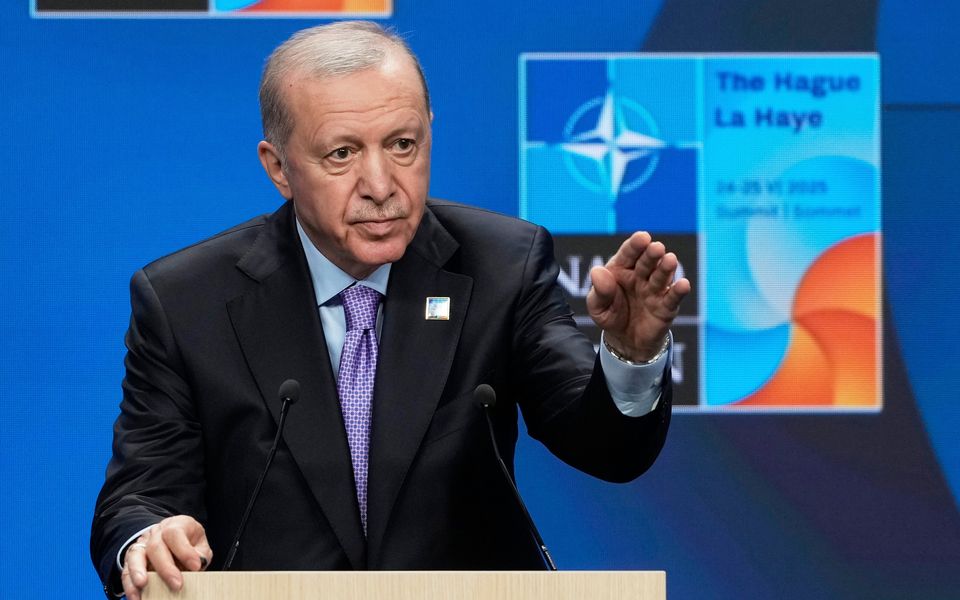
Turkish President Recep Tayyip Erdogan gestures during a press conference after the plenary session at the NATO summit in The Hague, Netherlands, on June 25, 2025. [Markus Schreiber/AP]
Article 5 of NATO is not a blank check. It has been triggered only once – after 9/11 – and even then only by consensus, with each ally choosing its own response. For Turkey, this means Article 5 is no guarantee: It requires persuading every ally, with no certainty of military action.
Geography is not Ankara’s problem. Article 6 extends protection to Turkey’s territory, ships and aircraft. The real issue is political: Whether an incident qualifies as an “armed attack” is always decided by consensus.
Here lies Turkey’s dilemma. NATO defines terrorism as a core threat and condemned Hamas’ attacks. The EU enforces binding sanctions on Hamas, prohibiting all support. When Turkey’s president insists Hamas is not a terrorist group and hosts its leadership in Istanbul, the clash with European commitments is stark.
If Israel strikes Hamas assets in Turkey, NATO would debate sovereignty versus terrorist infrastructure. A consensus for war would collide with EU law. At most, fragmented support might follow – never a collective battle.
The same logic applies at sea. In the “Poseidon’s Wrath” scenario – a contingency plan by Israel, Greece, Cyprus and Egypt if the threat from occupied northern Cyprus crosses a critical threshold – Article 5 offers Ankara no cover. The plan is not aggression but enforcement of international law: dismantling Turkish missile and drone bases, neutralizing intelligence hubs, and removing occupying forces. Its goal is Cyprus’ liberation and reunification under the sovereignty the EU itself demands. No ally will stand with Turkey; siding with an illegal occupation would mean breaching European law itself.
The wider maritime picture reinforces this. In December 2019, and again in 2025, the European Union ruled that the Turkey-Libya maritime memorandum “violates the sovereign rights of third states, is not in line with the Law of the Sea, and cannot produce legal consequences.” A NATO mobilization to defend such an unlawful claim is inconceivable. If Athens, Nicosia, Jerusalem or Cairo act to prevent its implementation, NATO has no legal grounds to intervene, and allies siding with Turkey would again be violating their EU obligations.
This contradiction is structural. The Lisbon Treaty obliges EU members to support common foreign policy and fight terrorism, not to shield it. Article 42(7) of the Treaty on European Union (TEU), the EU’s mutual defense clause, explicitly requires harmony with NATO – meaning NATO cannot be used to override EU law. Lisbon creates a legal obligation; Article 5 only a political option. In a clash, Lisbon prevails.
Turkey’s first nuclear plant, built and owned by Russia’s Rosatom, deepens Ankara’s dependence on Moscow. If it ever veered into military use, it would be a proliferation crisis, not a NATO defense issue. Turkish President Recep Tayyip Erdogan’s remark, “Some countries have missiles with nuclear warheads… and they tell us we can’t have them. I do not accept this,” hardly reassures allies. Any attempt to militarize Akkuyu would not trigger Article 5 protection but the opposite: The consequences would be sanctions, or even a preemptive strike – like Israel’s actions against Iraq’s Osirak reactor in 1981, Syria’s covert facility in 2007, or Iran’s nuclear infrastructure in 2025.
Strategically, NATO is less willing in 2025 to serve as Turkey’s shield. At the Hague summit, US officials openly cast doubt on automatic commitments. With Europeans counting defense costs, no government can justify using Article 5 to protect Hamas, illegal claims, or nuclear adventurism.
Nor is Hamas the only case: US Treasury reports in 2023 and 2025 exposed Istanbul-based companies channeling millions from Iran’s Quds Force to Yemen’s Houthis, financing drone and missile attacks on international shipping – including Greek-operated vessels. Ankara’s tolerance of these networks shows a broader complicity with Iran’s proxies. To defend a member-state that shields Hamas while enabling Houthis would not be collective defense but the legitimization of terrorism itself. No European parliament or court could endorse NATO defending such a record.
Article 5 was never designed to settle disputes inside NATO. It defends against external aggression, not intra-alliance rivalries. If Greece and Turkey clash directly, Article 5 will not be invoked against one ally on behalf of the other.
In Athens, Nicosia and Jerusalem, eyes are wide open. Greece has consistently challenged Turkey’s maritime memorandum, Cyprus has fought for its rights, and Israel has proven it can dismantle strategic threats disguised as civilian projects. The Eastern Mediterranean leaves no room for illusions.
For Turkey, Article 5 is dead. For Europe, this is clarity: NATO was built to defend allies from aggression – not to defend them from their own contradictions.
Shay Gal is an expert in international politics, crisis management, and strategic communications. He operates globally, focusing on power relations, geopolitical strategy, and public diplomacy, as well as their impact on policy and decision-making.